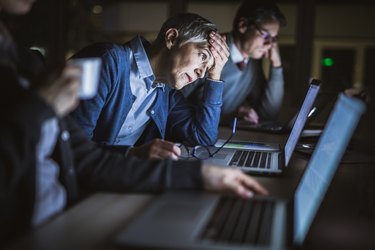
If you're dealing with headaches every day and feeling tired a lot, too, you're probably wondering what's behind this double whammy of discomfort. Often symptoms stem from a migraine. But if you don't have a headache disorder, your doctor can help pinpoint the cause of your symptoms.
Video of the Day
"Headaches and fatigue can occur frequently together, and fatigue may often precede the development of a migraine headache," says Miran Salgado, MD, chairman of neurosciences and chief of the division of neurology at New York-Presbyterian Brooklyn Methodist Hospital. He explains that fatigue can be an indicator that a migraine is going to happen, like the aura that some people get before their migraine develops.
Video of the Day
Migraines are a very common type of headache, affecting as many as 12 percent of Americans, according to the National Institute of Neurological Disorders and Stroke (NINDS). Symptoms include a throbbing or pulsing headache that often affects just one side of the head, nausea, vomiting and sensitivity to light, noise and odors. Left untreated, a migraine may last a few hours or as long as three days. You can also feel tired after a migraine.
The most common trigger for a migraine is stress, Dr. Salgado adds. Other triggers include certain foods, not eating on time, sunlight and dehydration.
Other Reasons for Headaches and Tiredness
Headaches aren't always to blame for tiredness. "Sometimes headache and fatigue may be symptoms of another condition," says Noah Rosen, MD, director of the Northwell Health Headache Center in Great Neck, New York, and a specialist in neurology, psychiatry and pain management. "Often this may be a disorder of homeostasis — that is, of the natural balance."
According to Dr. Rosen, other conditions that could cause both headaches and tiredness include:
- Dehydration
- Low iron (anemia)
- Low thyroid hormone (hypothyroidism)
- Liver problems
- Kidney disease
- Low blood sugar (hypoglycemia)
- Insomnia
- Snoring and obstructive sleep apnea
- Viral infections like mononucleosis
- Tick-borne illness, such as Lyme disease
People sometimes jump to the worst conclusion and suspect that a headache every day along with being tired might be a brain tumor, but Dr. Rosen says that's usually not the case. "Fatigue itself would be a rare symptom of a brain tumor," he explains, adding that it would be more concerning if someone were so sedated in sleep that it was very hard to rouse them.
Should I See a Doctor?
Dr. Rosen says that if headaches or tiredness keep you from participating in your life, like going to social events, family get-togethers, work or school, you should schedule a visit with your doctor. He or she may decide to refer you to a neurologist, a doctor who specializes in treating headaches and other disorders affecting the brain, nerves and spinal cord.
He adds that if you experience a sudden or rapid change in headaches or suddenly develop any symptoms that seem related to the brain, nerves or spinal cord, such as weakness on one side of the face or language difficulties, call your doctor right away.
NINDS also advises calling your doctor if you:
- Suddenly have a very severe headache, especially if you also have a stiff neck, confusion, shortness of breath or other unusual symptoms
- Have a headache after a head injury
- Have a new persistent headache, especially if you're older than 50
- Have a new type of headache that's occurring two times a week or more
- Have a headache when you're upright that goes away when you lie down
What Steps Can I Take?
Dr. Rosen says there are a number of steps you can take to try to keep headaches and excessive sleepiness at bay. These natural remedies for headaches include:
- Get enough sleep.
- Minimize your caffeine intake.
- Drink enough water.
- Don't skip meals.
- Get regular exercise.
Tip
NINDS recommends not using over-the-counter headache medicine more than twice a week. Taking it more often can lead to a rebound headache.
- Miran Salgado, MD, chairman, department of neurosciences and chief, division of neurology, New York-Presbyterian Brooklyn Methodist Hospital
- Noah Rosen, MD, director, Northwell Health Headache Center, Great Neck, New York
- National Institute of Neurological Disorders and Stroke: "Headache: Hope Through Research."
Is this an emergency? If you are experiencing serious medical symptoms, please see the National Library of Medicine’s list of signs you need emergency medical attention or call 911.